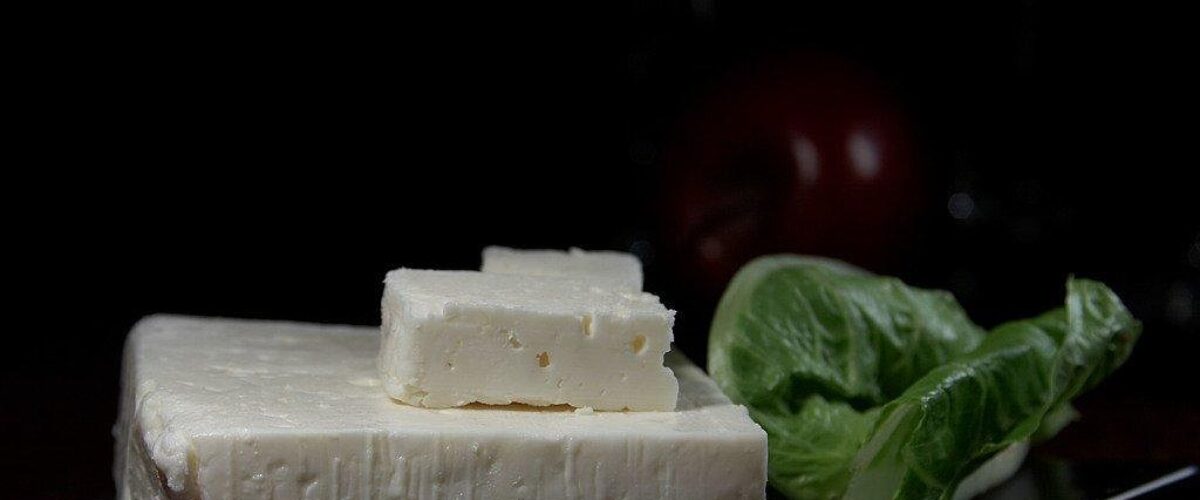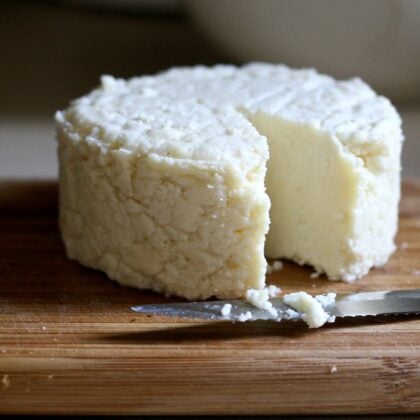
Does feta cheese contain lactose?
An emblematic cheese from Greece, feta is used in salads, Mediterranean dishes and even some modern recipes. But for people who are lactose intolerant, one question keeps coming up: Does feta cheese contain lactose and is it safe to eat?
What is feta cheese and how is it made?
Feta is a soft, semi-soft cheese from Greece. It has a Protected Designation of Origin (PDO), which means that it must be made using traditional methods from ewe's milk or a mixture of ewe's and goat's milk.
What makes it special is that it is maturing in brineThis gives it its typical salty taste and crumbly texture.
Does feta cheese naturally contain lactose?
Yes, like all cheeses, feta originally contains lactose, which is naturally present in milk. However, its quantity decreases sharply during fermentation.
On average, feta cheese contains around 0.5 to 1.5 g lactose per 100 gwhich is still much lower than milk (4.8 g/100 ml).
Why is feta often better tolerated than other cheeses?
Fermentation plays an essential role. Lactic acid bacteria consume some of the lactose present in milk to produce lactic acid, which reduces the final lactose content.
What's more, as feta cheese is generally eaten in small portions (cubes in a salad, pieces in a recipe), the amount of lactose ingested remains modest.
Can all lactose intolerant people eat feta cheese?
Not necessarily. It depends on your sensitivity:
-
mild to moderate tolerance Many people digest a portion of feta cheese well, thanks to its low fat content. lactose content.
-
strong intolerance Even small traces of lactose can trigger symptoms. In this case, feta cheese can be a problem.
Is there a lactose-free feta cheese?
Yes, some manufacturers are now offering lactose-free fetasobtained by adding of the lactase during manufacture. Lactose is then predigested, making the cheese suitable for intolerant people.
👉 Lactose-free" is always clearly indicated on the packaging.
What are the alternatives to feta cheese for very sensitive intolerant people?
-
Naturally low-lactose cheeses such as parmesan or the mature comté.
-
Lactose-free cheeses available in supermarkets.
-
Vegetable substitutes (soy-based preparations, cashew nuts, almonds, etc.).
How do you digest feta cheese if you are lactose-sensitive?
If you like feta cheese but are very sensitive, you can take a lactase supplement before your meal.
These solutions, like LACTOLERANCE 9000 or LACTOLERANCE ULTRAhelp to break down lactose present in cheeses, including feta, and help prevent digestive discomfort.
Summary
Feta cheese contains low lactose Thanks to its fermentation process, it is often better tolerated than other fromage frais. However, it all depends on your level of intolerance.
To continue enjoying your Mediterranean dishes without discomfort, you can count on LACTOLERANCEa lactose intolerance expert since 2010, offering solutions for all types of intolerant.
👉 Try our Discovery Pack!
Does feta cheese contain lactose?
Yes, feta contains lactose, as it is a milk-based cheese. However, its lactose content is low due to fermentation, around 0.5 to 1.5 g per 100 g.
Is feta cheese well tolerated by people with lactose intolerance?
Most intolerant people digest a portion of feta cheese well, but the most sensitive may experience symptoms even with small quantities.
Is there a lactose-free feta cheese?
Yes, some producers offer lactase-free fetas. They are sold with the words "lactose-free" on the packaging.
How much lactose does feta cheese contain?
Feta cheese contains around 0.5 to 1.5g of lactose per 100g, which is much less than milk or some fromage frais.
How do you digest feta cheese if you are very sensitive to lactose?
You can take a lactase supplement such as LACTOLERANCE 9000 or ULTRA before eating feta cheese to help digest the lactose.

Hello, I'm Vincent
Like you, I'm lactose intolerantI know exactly what you're going through and the difficulties you encounter on a daily basis. For over 10 years, I've been helping our customers to use our dietary supplements and giving advice and tips on how to improve their digestive comfort. I'm also a keen cook and gourmet, so you'll find my favourite recipes for a lactose-free diet in this blog.
Lactose intolerance is not inevitable! With LACTOLERANCE you can digest with complete peace of mind






